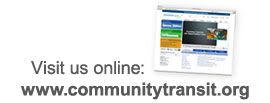Friday, March 29, 2013
Gov. Jay Inslee last week said he supports passage of a transportation funding package this year. He was not specific about what he wanted to see in such a package, nor what he would not accept.
Three bills exist which could bring new funding to Community Transit - two "local option" bills that could allow the agency to go to local voters for funding, and a statewide transportation package that could bring some new state funding to transits as well as a local option.
Next week, both chambers are expected to announce their transportation budget proposals, so we'll know more about where transit's needs are addressed. Word in Olympia is that the statewide package introduced in the House last month (HB 1954) is being retooled to make it more likely to pass this session. Translated, that means it is getting smaller and likely will have even less money dedicated for transit.
Community Transit, as well as King County Metro Transit, Pierce Transit and the Washington State Transit Association, continue to talk to legislators to ask for robust new transit funding this year. Several organizations also are addressing legislators to request strong transit funding.
Economic Alliance Snohomish County will gather in Olympia on Friday, April 5 to urge county legislators to support a transportation package that includes transit funding. Also, Transportation Choices Coalition will be in Olympia on Wednesday, April 3 to press King County legislators to support transit funding.
Three bills exist which could bring new funding to Community Transit - two "local option" bills that could allow the agency to go to local voters for funding, and a statewide transportation package that could bring some new state funding to transits as well as a local option.
Next week, both chambers are expected to announce their transportation budget proposals, so we'll know more about where transit's needs are addressed. Word in Olympia is that the statewide package introduced in the House last month (HB 1954) is being retooled to make it more likely to pass this session. Translated, that means it is getting smaller and likely will have even less money dedicated for transit.
Community Transit, as well as King County Metro Transit, Pierce Transit and the Washington State Transit Association, continue to talk to legislators to ask for robust new transit funding this year. Several organizations also are addressing legislators to request strong transit funding.
Economic Alliance Snohomish County will gather in Olympia on Friday, April 5 to urge county legislators to support a transportation package that includes transit funding. Also, Transportation Choices Coalition will be in Olympia on Wednesday, April 3 to press King County legislators to support transit funding.
Monday, March 18, 2013
Legislative Update: Transit Funding on Backburner for Now
 |
| Photo: Wikipedia |
There were two bills that would benefit Community Transit directly - HB 1953 and SB 5773. The senate bill died, but the house bill was declared required to implement the budget, so it can be brought back later.
Separately, House Transportation Committee Chair Judy Clibborn's comprehensive transportation funding package (HB 1954) is also on hold until budget discussions take place beginning later this month. Legislative leaders have said dealing with the budget deficit and funding K-12 education are their top priorities this session, but the fact that transit funding is still alive means there is hope.
On March 20, the state economic forecast will provide the next big piece to the state funding puzzle as it will advise legislators on how much money is expected to be available this biennium. Then the numbers crunching will begin. It is expected that transportation funding will be a lower priority in these discussions, but still on the table.
Meanwhile, groups like the Washington State Transit Association, Transportation Choices Coalition and even the Association of Washington Business continue to push legislators for some type of transportation funding package. That will help keep the issue at the table.
Friday, March 15, 2013
March 18 is Bus Driver Appreciation Day
 Bus drivers have a tough job. They drive around all day picking up strangers and asking them for money. They drive the same route over and over. They have to be on time, but can't leave a stop early. And they certainly hear about it if they're late!
Bus drivers have a tough job. They drive around all day picking up strangers and asking them for money. They drive the same route over and over. They have to be on time, but can't leave a stop early. And they certainly hear about it if they're late!Whether their child is sick, their favorite team lost last night or they are in the midst of a personal crisis, they are expected to smile and be professional to all customers they encounter every day.
It's pretty amazing what they do. Like other customer service jobs where you hear all about the bad stuff but hardly ever the good, it can really make your day to hear a heartfelt "Thank you!"
Let's all say thank you to our drivers on Monday, March 18. It's a small gesture that can mean so much. And if your driver does a good job on Tuesday, say thanks then as well. Why not?
Monday, March 11, 2013
Community Transit Seeks Comment on Non-Discrimination Plan
Federally-required plan outlines ways in which transit agency engages minority populations
Community Transit invites the public to comment on our Title VI Non-Discrimination Plan that addresses how the agency engages minority populations.
Title VI of the Civil Rights Act of 1964 states that "No person in the United States shall, on the grounds of race, color, or national origin, be excluded from participation in, be denied the benefits of, or be subjected to discrimination under any program or activity receiving Federal financial assistance."
As recipients of Federal Transit Administration (FTA) funds, Community Transit is required to have a Title VI program which is updated and submitted to the FTA every three years. Our proposed Title VI Non-Discrimination Plan is available online at http://www.communitytransit.org/title6 or by calling (425) 353-7433 to request a copy. The Title VI webpage provides Google Translator so it can be read in up to 65 languages.
Public comment on the proposed plan will be accepted through April 8. Comments may be submitted in one of the following ways:
Wednesday, March 27
5 p.m. - 7:30 p.m.
Snohomish PUD, Monroe Office
120 East Fremont Street, Monroe, WA 98272
Thursday, April 2
12 p.m. - 2 p.m.
Edmonds Community College
Brier Hall, Room 231
20000 68th Ave W, Lynnwood, WA 98036
Community Transit invites the public to comment on our Title VI Non-Discrimination Plan that addresses how the agency engages minority populations.
Title VI of the Civil Rights Act of 1964 states that "No person in the United States shall, on the grounds of race, color, or national origin, be excluded from participation in, be denied the benefits of, or be subjected to discrimination under any program or activity receiving Federal financial assistance."
As recipients of Federal Transit Administration (FTA) funds, Community Transit is required to have a Title VI program which is updated and submitted to the FTA every three years. Our proposed Title VI Non-Discrimination Plan is available online at http://www.communitytransit.org/title6 or by calling (425) 353-7433 to request a copy. The Title VI webpage provides Google Translator so it can be read in up to 65 languages.
Public comment on the proposed plan will be accepted through April 8. Comments may be submitted in one of the following ways:
- By email to title6@commtrans.org
- By postal mail to Community Transit, 7100 Hardeson Rd., Everett, WA 98203, Attn: Title VI Officer
- By phone to (425) 353-7433
- In person at one of the following Community Meetings:
Wednesday, March 27
5 p.m. - 7:30 p.m.
Snohomish PUD, Monroe Office
120 East Fremont Street, Monroe, WA 98272
Thursday, April 2
12 p.m. - 2 p.m.
Edmonds Community College
Brier Hall, Room 231
20000 68th Ave W, Lynnwood, WA 98036
A public hearing on the Title VI Non-Discrimination Plan will take place before the Board of Directors:
Thursday, April 4
3 p.m.
Community Transit Board Room
7100 Hardeson Road, Everett, WA 98203
Please note that public comments to the Title VI Non-Discrimination Plan must be made through the four bulleted methods listed above. Comments on this blog and on our Facebook page in no way constitute a legal or official notice or comment to Community Transit. We appreciate your cooperation!
Thursday, April 4
3 p.m.
Community Transit Board Room
7100 Hardeson Road, Everett, WA 98203
Please note that public comments to the Title VI Non-Discrimination Plan must be made through the four bulleted methods listed above. Comments on this blog and on our Facebook page in no way constitute a legal or official notice or comment to Community Transit. We appreciate your cooperation!
Friday, March 1, 2013
Transit Funding Bills Pass Out of Committee
Two bills aimed at providing new funding options for Community Transit have passed out of their respective State House and Senate transportation committees. The bills (HB 1953 and SB 5773) would give Community Transit authority to seek new funding from local voters.
One change occurred to help get the senate bill out of committee. Rather than a motor vehicle excise tax, the funding source is now the retail sales tax. Currently, Community Transit gets revenue from a 0.9 percent sales tax within the service district (9 cents on a $10 purchase). Both bills would allow the agency to ask voters to increase that tax by up to an additional 0.3 percent.
One change occurred to help get the senate bill out of committee. Rather than a motor vehicle excise tax, the funding source is now the retail sales tax. Currently, Community Transit gets revenue from a 0.9 percent sales tax within the service district (9 cents on a $10 purchase). Both bills would allow the agency to ask voters to increase that tax by up to an additional 0.3 percent.
Subscribe to:
Comments (Atom)





